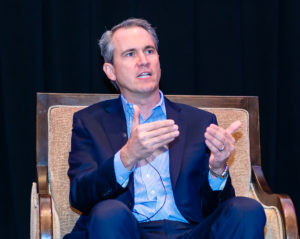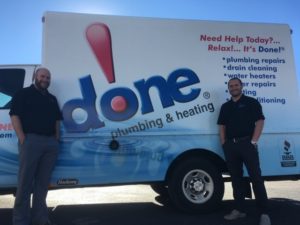
Businesses Finding Success – and Making a Big Impact
Small business continues to play a big role in Colorado’s economy, employing 1.1 million people and representing 99.5 percent of businesses. But, something bigger happens through these businesses, says Colorado Lending Source Executive Director Mike O’Donnell.
“I’m of the opinion that if you work for yourself or you create your own business you’ll be 100 percent engaged,” O’Donnell said, “and the small group of employees you build around you will more than likely be very actively engaged.”
What makes a business successful – transforms it from an idea to an actual product or service that makes a difference and builds a career for others? Four business owners share their stories – of start-up, of buying a business and of growing and securing the funding to match their customers’ needs.
Cooking up a new kind of fast-casual
Fetien Gebre-Michael’s business may be small, but she’s thinking big – and she wants to build the Chipotle of Ethiopian cuisine here in Colorado.

“I’m dreaming big,” she said.
With 11 siblings, Gebre-Michael only knows how to cook for large groups – something that came in handy when she started producing events. And what started as a side gig while she went back to school has become Konjo Catering and Events, which also boasts a food truck.
She wowed the judges at the Denver Metro Small Business Development Center’s Trout Tank: Food Frenzy with her Ethiopian cuisine and her vision for a fast-casual concept honoring her African heritage – an idea that she honed through Trout Tank and a loan readiness program, Scale Up.
Through Trout Tank she gained mentors from restauranteurs and concessionaires like Mission Yogurt, Maria Empanada, Punch Bowl Social and Larimer Associates, who she says still take time to talk through business challenges with her.
“It was about the connections I could make,” she said, adding that, “it was a confidence booster, too.”
And, immersing herself in several startup accelerators “really pushed me to say OK, you have to get your stuff together.”
Trout Tank also created an introduction to a lender – she is working to secure funding to open a stall in a food hall to test her concept: “I’m in a great position right now to get out there.”
Uncovering resources for starting up at the Chamber
As Mark Spiecker mulled over his next bioscience start-up with his business partners Joe Bagan and Jeff Hval, he was questioning whether he’d continue in Denver. It was where he’d started and scaled a series of companies, most recently Sharklet Technologies, but the Kansas City native considered returning home.

Then, while sitting in a Chamber board meeting, he heard from the head of the Metro Denver Economic Development Corporation – an affiliate of the Chamber – about the support they offer to businesses who are starting or growing, from finding a location and getting building permits to navigating tax incentives for creating jobs.
When he reached out to learn more, “the Metro Denver EDC deployed a team of people to make sure I knew that they wanted me to grow the business here,” Spiecker said.
And, they made it easy for him to focus on his business while they worked on those details. STAQ Pharma – a pharmaceutical manufacturing facility that will create ready-to-use doses of prescriptions for hospitals – is under construction in northeast Denver. It will be home to one of the largest clean rooms in the state and will incorporate robotic technology to avoid human error. They plan to add more than 70 new jobs, and through their work with the Metro Denver EDC they were approved for incentives – totaling nearly $1 million – when those jobs are added.
These resources, particularly as they started up, were invaluable, Spiecker said.
“Everybody should be reaching out … we were three guys with a business plan,” he said. “They gave us the same level of attention that any of the big companies would have gotten.”
Buying the family business
When Jeromy Metz’s family asked him to take over their business, Done Plumbing and Heating, he was apprehensive. More than 15 years later, he knows it was the best choice he could have made.

Instead of simply taking the reins, it was important to him to create a buyout plan for his parents.
“I insisted on buying the company,” Metz said. “I didn’t want to be handed the business.”
He looked at it like buying any other existing business and leaned on his longtime law firm, Minor & Brown, and his accountants to make it a smooth transition.
“We got outside experts involved a lot to help us and try to take as much emotion out of it as possible,” he said.
In buying an existing business, he had the benefit of an established reputation, customers and vendors.
“The benefit for me was I didn’t have to do any of that. That was set up by the time I bought it,” he said. “I didn’t have to have that initial ‘take a risk on me.’”
But, it gave him the opportunity to push the business forward. He transitioned their HVAC technicians to a four-day workweek – something that was uncommon when he made the shift but now is becoming an industry standard. He also recruited his younger brother, who owns a
minority stake in Done Plumbing and Heating, to add more technology to the toolboxes of their field team.
“I just continued down the path and made sure the company grew with the times,” Metz said.
Poising a business for growth in the outdoors
Kelly Watters and her husband Will met as ski instructors in Vail. But it was once they returned to city living, they realized that the outdoors really start at a person’s front door – and saw a gap in apparel that worked well in active settings like a hike or a bike but were versatile (and fashionable) enough to transition to dinner or travel.

With that, Western Rise was born four years ago. For this couple, the start-up community they needed was right here in the Rockies – this time in Telluride – as part of the Telluride Venture Accelerator.
Watters says they could grow 140 percent in 2019, and that as they scale they’re looking for funding that scales with them. Since they’ve started, they’ve explored nearly every avenue to access capital.
“We’ve done the full gamut of funding, from family and friends, to our own paychecks to loans from organizations like Colorado Lending Source and Kickstarter,” Watters said.
That Kickstarter campaign ended up being one of the most successful in the crowdfunder’s history: “It was an overwhelmingly big deal.”
With a recent round of nearly $1 million in funding, they will add four full-time employees and could potentially quadruple their sales by doubling their team.
“Our hearts have always been in the mountains and in Colorado,” Watters said. “One of the things we personally care about is growing it in a community like Telluride where we can offer stable jobs for young, educated individuals who want to stay and grow in these towns.”
Sara Crocker is the communications manager for the Denver Metro Chamber.
